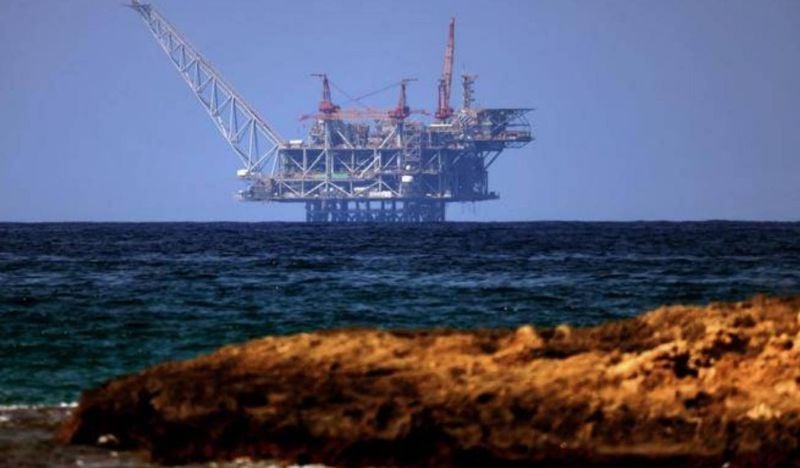
The platform of the Leviathan gas field in the Mediterranean Sea, photographed from Nasholim beach on Israel's northern coast. Aug. 29, 2022. (Credit: AFP)
According to Hacen Soli, the war in Gaza “was never about Hamas.” Israel is destroying the enclave’s infrastructure “so they can benefit from the natural gas reserves,” said the Egyptian dentist in a video that got over 500,000 views on TikTok.
Using the same argument, CJ Werleman, an Australian commentator with 170,000 followers on YouTube, described the war as “genocide motivated purely by greed and profit.”
Richard Medhurst, who presents himself as a Syrian-British journalist, sees the war as part of a broader Western plan to promote Israeli gas exports through the new India-Middle East-Europe Economic Corridor (IMEC), which runs from India, through the Gulf and Israel, to Europe. “All the while cutting off Russian, Iranian and Arab gas from the international market,” he added, in a video that got 125,000 likes on Instagram. “And that’s exactly why they’re in Gaza slaughtering Palestinians.”
But these theories, in addition to being full of dubious interpretations, pose a serious problem: they explain a complex and multifaceted war solely through the geostrategic prism. Yet, even this geopolitical argument doesn’t hold.
Here’s why.
What is Gaza Marine?
Discovered by British Gas in 2000, the Gaza Marine natural gas field, located offshore the Gaza Strip is estimated to hold 32 billion cubic meters of natural gas. It is complemented by a smaller field of 3 billion cubic meters near Palestinian and Israeli territorial waters. These estimates far exceed the needs of the Palestinian territories in energy. They represent a bonanza of $700 to $800 million a year, according to the calculations of Palestinian economist Samir Hulileh.
But Gaza Marine was never developed because of Israel’s objections. Israel feared that the Palestinian territories would gain energy independence and that the revenues would end up in Hamas’ pockets. Faced with successive deadlocks, Royal Dutch Shell acquired Gaza Marine in 2016 through its acquisition of BG Group, which have up its stake to the Palestinian Authority (PA) in 2018.
But on June 18, 2023, Israel reversed its position, giving its preliminary consent to an agreement to develop the Gaza Marine between the PA and an Egyptian consortium, which includes the Egyptian state gas company EGAS. Israeli Prime Minister Benjamin Netanyahu nevertheless stated that progress on this issue would depend on “preserving the State of Israel’s security and diplomatic needs,” requiring security coordination between Cairo and Ramallah.
It is illogical to believe that after 20 years of objection, Tel Aviv finally approved the development of the field, only to bomb Gaza four months later just to get its hands on it.
What are Israel’s gas capacities, needs and export plans?
In 2022, Israel produced 21.29 billion cubic meters of gas, of which 9.21 billion cubic meters were exported to Egypt and Jordan. Israel hopes to double its production over the next few years and enter new markets, particularly in Europe. Three reservoirs in the country are currently operational: Tamar, Leviathan and Karish. A new reservoir, Olympus, was discovered in 2022.
The massive Leviathan field (623 billion cubic meters) and the Tamar field (200 billion cubic meters) are Israel’s main gas resources. By comparison, the potential revenues from Gaza Marine (32 billion cubic meters) are extremely minimal. If Gaza Marine were to be seized by Israel, its development would have no significant impact on the country’s energy independence or its export plans.
“If productive, which it is not, Gaza Marine would produce about 2 percent of what is currently being produced s from Tamar and Leviathan. In other words, Gaza Marine is not something Israel finds worth going to war over — especially considering that the war threatens its much larger, pre-existing projects,” said Karen Young, a senior researcher at Columbia University’s Center on Global Energy Policy.
Located within range of Hamas rockets, the Tamar platform suspended operations for security reasons on Oct. 9, two days after the start of the wars. Its operator, the American multinational energy corporation Chevron, announced Monday that it resumed production, 20 percent of which is generally destined for Egypt and Jordan.
“The resumption of production at the Tamar field is sent in part through a pipeline to Egypt, where it can then be exported as LNG and used for domestic electricity production. This is key to Israel and Egypt’s economic relations,” Young added.
On Oct. 29, Israeli Energy Minister Israel Katz said he granted 12 licenses to six companies to explore the Leviathan field. A group led by Italy’s Eni (ENI.MI) with Dana Petroleum and Israel’s Ratio Energies (RATIp.TA) will explore a zone to the west of the field. A second group, including Azerbaijan’s national oil company Socar, BP (BP.L) and Israel’s NewMed (NWMDp.TA), will explore the north of the field.
“The winning companies have committed to unprecedented investment in natural gas exploration over the coming three years, in the hope of discovering new natural gas reserves,” said Katz. This is yet another sign that Israel’s gas ambitions are directed to the other side of Gaza Marine.
Above all, videos circulating online that claim the geostrategic argument as the sole reason behind the war have forgotten a key fact: the war was launched by Israel in response to Hamas’ Oct. 7 assault. This sophisticated, unprecedented attack imposed on Israel the obvious war aim of destroying Hamas, or at least its capacity to cause harm and commit a similar massacre again.
This article was originally published in French in L'Orient-Le Jour. Translation by Joelle El Khoury.